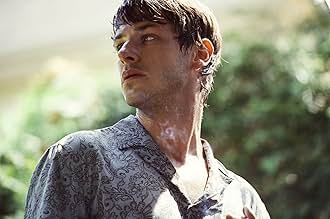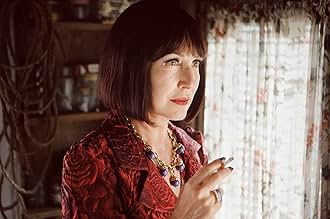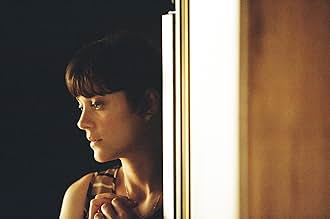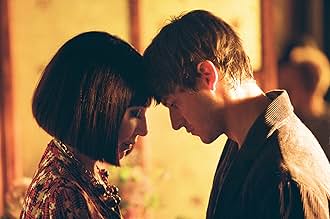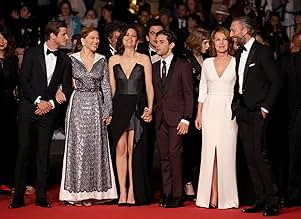IMDb RATING
6.8/10
26K
YOUR RATING
Louis (Gaspard Ulliel), a terminally ill writer, returns home after a long absence to tell his family that he is dying.Louis (Gaspard Ulliel), a terminally ill writer, returns home after a long absence to tell his family that he is dying.Louis (Gaspard Ulliel), a terminally ill writer, returns home after a long absence to tell his family that he is dying.
- Director
- Writers
- Stars
- Awards
- 19 wins & 39 nominations total
Antoine DesRochers
- Pierre Jolicoeur
- (as Antoine Desrochers)
- Director
- Writers
- All cast & crew
- Production, box office & more at IMDbPro
Featured reviews
b.r.i.l.l.i.a.n.t! I saw this movie at TIFF on Sept. 17 and it was the first Dolan film I've seen. It deserves the award it received at Cannes! Despite all the shouting and intensity, this film conveys with subtlety, suggestive dialogue and glances, the range of emotions felt by different members of a family when there has been an unexplained loss of another family member. Even though the main character, Louis, is still alive and returns to the family, they react as if he has returned from an unexpected death. They range from guilt, rage, idealization, and denial.The close-up filming style also reveals each family member's pain in intimate detail. Dolan is brilliant in his interpretation of that family's deep pain and Louis's coming to terms with not only his own impending death but the "death" the family already has had to deal with when he went away the first time.
The story is familiar. because the portrait of dysfunctional family is not rare in the cinema of last decades. but the film has a fundamental virtue - it is a Xavier Dolan work. and that change everything. because not the conflicts, vulnerabilities, isolation, angry and fears, the return of the son are the basic aspects. but the precise and not comfortable image of loneliness. using admirable cinematography. the right actors. the close up. the forceof silence. the small gestures and shadows of memories. the admirable cold dialogues. and the last part as ideal building for a search who becomes out of target. a film who impress. not only for artistic value. but for remarkable science to present the things who are out of us being inside us. frustrations, intentions, the desire to be far by the other who could represent only the stranger. who is just an accident. so, a beautiful Xavier Dolan.
Somehow even worse than your run-of-the-mill terrible movies. "Waterworld" and "Catwoman" are basically benign. Xavier Dolan, with his big name cast, his pretensions of art-house cinematography, his maudlin dialogue, and his iMovie sound mixing, really insults the moviegoers. He thinks we'll eat up this kind of crap-- and, if Cannes is any indicator, we totally have.
I really think that the only real pleasure anyone can derive from watching this Lifetime-Movie-knockoff of a film is by turning around in your seat and watching everyone try to maintain the 'studious cinephile' straight face while watching a slow-motion tear fall from Vincent Cassel's eye. There's also a winning bit with the "Numa Numa" song played over images of children frolicking through a field at dusk. Nostalgia.
I really think that the only real pleasure anyone can derive from watching this Lifetime-Movie-knockoff of a film is by turning around in your seat and watching everyone try to maintain the 'studious cinephile' straight face while watching a slow-motion tear fall from Vincent Cassel's eye. There's also a winning bit with the "Numa Numa" song played over images of children frolicking through a field at dusk. Nostalgia.
I read Jean-Luc Lagarce's play "Juste la fin du monde" a while back and it didn't really make an impression on me. So I was quite intrigued and just a tiny bit worried when I learned that Xavier Dolan, possibly my favorite contemporary film director, was adapting this to me impenetrable text into a movie.
I had confidence in Dolan's genius and was rewarded beyond expectations. The film is as magnificent as anything Dolan has created before. He has said in interviews that at first reading Lagarce's language- also off-putting for me- didn't impress him but that he discovered its power on second random reading. I'm grateful he did and that he has now shared this discovery with his audience with the aid of some truly superb acting performances.
The very first scene establishes everything with narration by protagonist Louis (Gaspard Ulliel), a successful author who is flying to see his family for the first time in over a decade. Louis is dying. Dolan hides Ulliel's face with shadowy lightning and a cap as well as utilizes close-ups so extreme you can't get a proper feel of a face. The close focus continues in the following scenes of Louis's family, only to very gradually move away as the film progresses.
Greeting Louis are his extravagant mother Martine (Nathalie Baye), his coolly detached younger sister Suzanne (Léa Seydoux), his dominant yet socially awkward older brother Antoine (Vincent Cassel) as well as Antoine's shy, even more socially awkward wife Catherine (Marion Cotillard).
Dolan tends to depict extreme personal conflict in his work, uniting his fiercely dramatic, richly colored and always unique visuals with raw scripts that seem to channel Ingmar Bergman's best work. This also occurs in "Juste la fin du monde".
If you looked at the movie without sound you could mistake it for a regular- if exceptionally well shot and acted- drama about a family uniting with the result of old wounds and conflicts emerging and taking over the scenes. This is indeed what basically happens here, but the dialog, to me so difficult to digest from the pages of a book, makes it all about what is left unsaid. Because even as extreme emotion takes over the characters and bursts out they still can't communicate with each other. Lines that one would expect to convey full, sincere, angry honesty are expressed through awkward, even incomprehensible dialog that only hints at the apparently troubled history of these people.
Louis, as mellow and conciliatory as he acts, seems to be a dangerous catalyst for his family, an antigen they all defend their nest against. This is endlessly fascinating and sold so well by the actors, each and every one of them marvelous. The title becomes darkly ironic, as Louis soon seems to find his impending death a minor problem in his severely dysfunctional family. He connects with Catherine, another outsider and someone who he hasn't met before this one day during which the whole film occurs. "How much time?" Catherine asks Louis, a question that together with the offhand mention of Louis's first boyfriend having passed away from "cancer" establishes the fatal backdrop of the AIDS epidemic.
At first glance "Juste la fin du monde" might seem like a melodramatic shouting match that emerges unfocused and aimless, but I ultimately find it urgently compelling and even insightful through its sustained aversion to a genuine unmasking of characters.
Lagarce wrote the original play in 1990, reportedly to examine his own mortality. He was dying himself at that time and finally succumbed to AIDS in 1994. There is a touching dimension to the script's nightmarish reunion as we sense Louis's need to come full circle, to rediscover his childhood and adolescence, even to assure himself that his already estranged family can survive after he's gone. Death is ever present, and instead of trivializing the personal conflicts it elevates them, because they are if nothing else moments of vitality for people not truly living.
I had confidence in Dolan's genius and was rewarded beyond expectations. The film is as magnificent as anything Dolan has created before. He has said in interviews that at first reading Lagarce's language- also off-putting for me- didn't impress him but that he discovered its power on second random reading. I'm grateful he did and that he has now shared this discovery with his audience with the aid of some truly superb acting performances.
The very first scene establishes everything with narration by protagonist Louis (Gaspard Ulliel), a successful author who is flying to see his family for the first time in over a decade. Louis is dying. Dolan hides Ulliel's face with shadowy lightning and a cap as well as utilizes close-ups so extreme you can't get a proper feel of a face. The close focus continues in the following scenes of Louis's family, only to very gradually move away as the film progresses.
Greeting Louis are his extravagant mother Martine (Nathalie Baye), his coolly detached younger sister Suzanne (Léa Seydoux), his dominant yet socially awkward older brother Antoine (Vincent Cassel) as well as Antoine's shy, even more socially awkward wife Catherine (Marion Cotillard).
Dolan tends to depict extreme personal conflict in his work, uniting his fiercely dramatic, richly colored and always unique visuals with raw scripts that seem to channel Ingmar Bergman's best work. This also occurs in "Juste la fin du monde".
If you looked at the movie without sound you could mistake it for a regular- if exceptionally well shot and acted- drama about a family uniting with the result of old wounds and conflicts emerging and taking over the scenes. This is indeed what basically happens here, but the dialog, to me so difficult to digest from the pages of a book, makes it all about what is left unsaid. Because even as extreme emotion takes over the characters and bursts out they still can't communicate with each other. Lines that one would expect to convey full, sincere, angry honesty are expressed through awkward, even incomprehensible dialog that only hints at the apparently troubled history of these people.
Louis, as mellow and conciliatory as he acts, seems to be a dangerous catalyst for his family, an antigen they all defend their nest against. This is endlessly fascinating and sold so well by the actors, each and every one of them marvelous. The title becomes darkly ironic, as Louis soon seems to find his impending death a minor problem in his severely dysfunctional family. He connects with Catherine, another outsider and someone who he hasn't met before this one day during which the whole film occurs. "How much time?" Catherine asks Louis, a question that together with the offhand mention of Louis's first boyfriend having passed away from "cancer" establishes the fatal backdrop of the AIDS epidemic.
At first glance "Juste la fin du monde" might seem like a melodramatic shouting match that emerges unfocused and aimless, but I ultimately find it urgently compelling and even insightful through its sustained aversion to a genuine unmasking of characters.
Lagarce wrote the original play in 1990, reportedly to examine his own mortality. He was dying himself at that time and finally succumbed to AIDS in 1994. There is a touching dimension to the script's nightmarish reunion as we sense Louis's need to come full circle, to rediscover his childhood and adolescence, even to assure himself that his already estranged family can survive after he's gone. Death is ever present, and instead of trivializing the personal conflicts it elevates them, because they are if nothing else moments of vitality for people not truly living.
This is the latest film from Xavier Dolan who continues to surprise with his very human stories. This time he has gone for an 'A list' of French talent. The story is from the stage play of the same name and is about Louis (Gaspard Ulliel 'A Very Long Engagement') who is a successful writer; he has not been home for twelve years and has now only returned to announce that he is dying – but he does not know how to do it.
On arrival at his home he is met by his family, mother, older brother and much younger sister. His brother, Antoine, played by Vincent Cassel is a man who seems to have got more than his fair share of life's anger but has married a shy creature – Catherine – played by Marion Cotillard in a way that she owns the role, it is completely convincing. The whole day is played out in linear format as the characters stumble into each other always seeming to be on the edge of imploding.
This is not an easy to watch movie as the tension can be uncomfortable but that makes it a better film for it. This is real 'Arthouse' in that it takes a different path to many that have gone before and is becoming a welcomed trademark of Xavier Dolan.
If you liked any of his previous films then you are probably already sold on this, if you are new to him then switch off any expectations and let this film seep into your psyche, it will be worth the effort.
On arrival at his home he is met by his family, mother, older brother and much younger sister. His brother, Antoine, played by Vincent Cassel is a man who seems to have got more than his fair share of life's anger but has married a shy creature – Catherine – played by Marion Cotillard in a way that she owns the role, it is completely convincing. The whole day is played out in linear format as the characters stumble into each other always seeming to be on the edge of imploding.
This is not an easy to watch movie as the tension can be uncomfortable but that makes it a better film for it. This is real 'Arthouse' in that it takes a different path to many that have gone before and is becoming a welcomed trademark of Xavier Dolan.
If you liked any of his previous films then you are probably already sold on this, if you are new to him then switch off any expectations and let this film seep into your psyche, it will be worth the effort.
Did you know
- TriviaFirst film directed by Xavier Dolan with only French actors in the cast. His previous films were all starred by Canadian actors. This film, however, was shot entirely in Canada.
- Quotes
Antoine Knipper: We think silent people are good listeners. But I shut up so people leave me alone.
- ConnectionsFeatured in Xavier Dolan: Bound to Impossible (2016)
- SoundtracksHome Is Where It Hurts
Written by Camille, Dominique Dalcan, Matthew Ker
Performed by Camille
Published by Blonde Music and Balulalo
Authorized by Warner Music Canada for Parlophone Music France
- How long is It's Only the End of the World?Powered by Alexa
Details
- Release date
- Countries of origin
- Official sites
- Languages
- Also known as
- Juste la fin du monde
- Filming locations
- Sainte-Dorothée, Laval, Québec, Canada(house interiors)
- Production companies
- See more company credits at IMDbPro
Box office
- Budget
- €6,900,000 (estimated)
- Gross worldwide
- $9,231,823
- Runtime
- 1h 37m(97 min)
- Color
- Sound mix
- Aspect ratio
- 1.85 : 1
Contribute to this page
Suggest an edit or add missing content

![Watch Bande-annonce [OV]](https://m.media-amazon.com/images/M/MV5BOWE2Nzg5NjctOWNhNi00MTEwLWIzOTMtOWQ2MWY1YjM5Y2JjXkEyXkFqcGdeQXRyYW5zY29kZS13b3JrZmxvdw@@._V1_QL75_UX500_CR0)
![Bande-annonce [OV]](https://m.media-amazon.com/images/M/MV5BOTExZGFjM2MtMTFhZC00Y2E3LWJiZGEtNzU4ODlhOGRhZDc0XkEyXkFqcGdeQXRyYW5zY29kZS13b3JrZmxvdw@@._V1_QL75_UX500_CR0)


